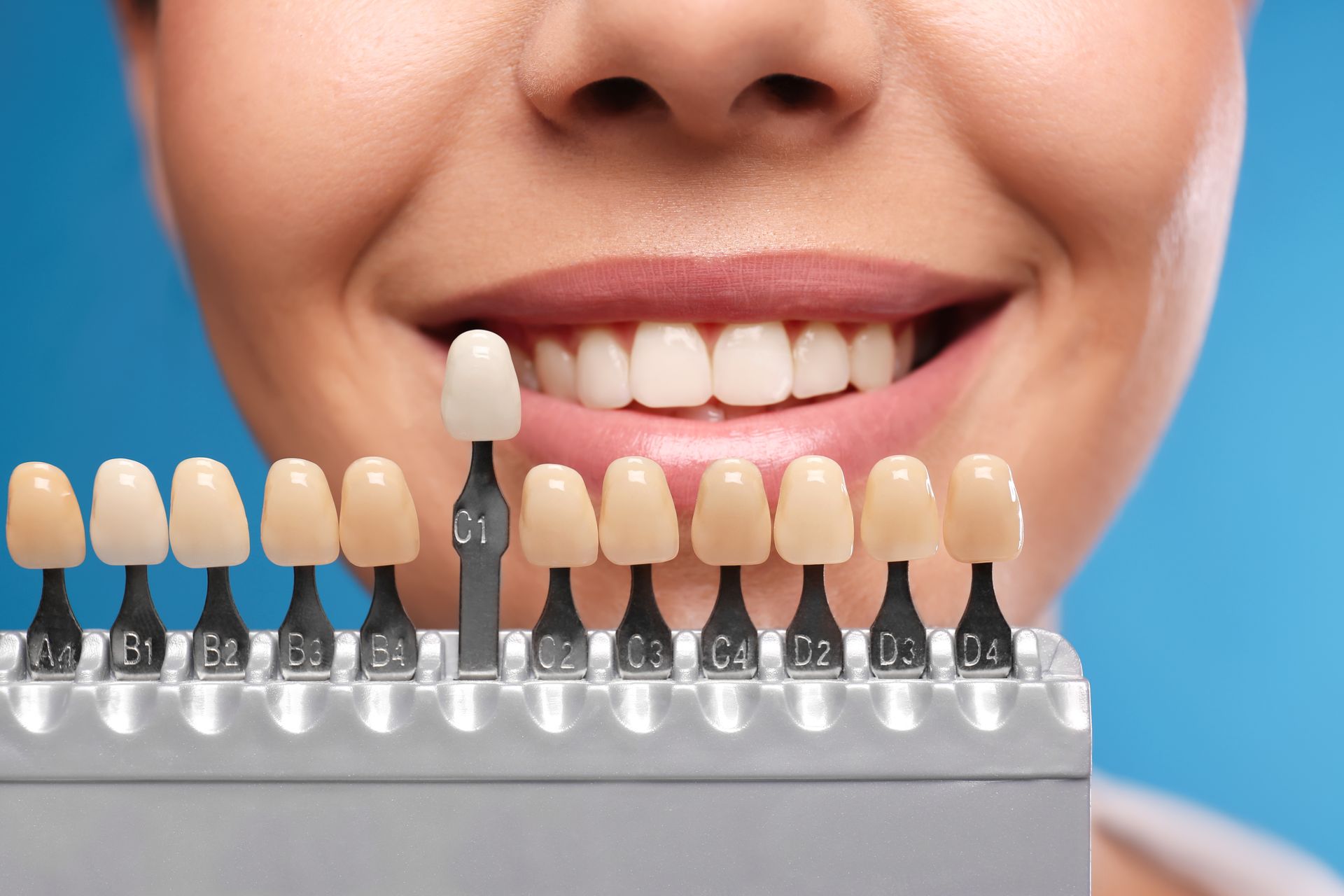Does Medicare Cover Dental Implants?What Tukwila Patients Should Know

At West Valley Dental in Tukwila, we talk with many seniors and near-retirees who are thinking about dental implants and worried about how to pay for them. Our dentist, Dr. Kuzi Hsue, has been caring for patients in the Seattle area for decades and has advanced training in implants and other complex treatments. Our team works with Medicare every day, so we understand how confusing dental benefits can be and how they affect real treatment decisions.
In most cases, Original Medicare does not cover dental implants. It may help with certain medical parts of your care, and some Medicare Advantage plans may offer limited coverage for implant-related treatment, but there is no simple "yes" or "no" for every patient.
This guide will walk you through what you need to know so you can ask better questions, avoid surprises, and plan wisely.
Why Medicare and Dental Implants Feel So Confusing
Common questions Tukwila seniors ask about dental implant coverage
Patients often ask:
- "Does Medicare cover dental implants at all?"
- "Can I get Medicare to pay if my dentist says the implants are medically necessary?"
- "What if I get a Medicare Advantage plan with dental coverage?"
These are smart questions. The problem is that Medicare rules are written for medical care first, not for everyday dental work. That makes it hard to know what is and isn't covered without reading the fine print of your plan.
How dental costs add up without clear insurance answers
Dental implants are a long-lasting solution for missing teeth, but they are also a big investment. Costs can include:
- Exams and X-rays
- Tooth removal
- Bone grafts
- The implant itself
- A crown, bridge, or denture on top of the implant
When you're not sure what Medicare will help with, it can feel risky to even schedule a consult. Understanding the basics of how Medicare works is the first step.

Quick Overview of Medicare for Tukwila Patients
What Original Medicare (Parts A & B) is designed to cover
Original Medicare has two main parts:
- Part A – Hospital insurance (inpatient stays, skilled nursing, some home health and hospice)
- Part B – Medical insurance (doctor visits, outpatient care, some preventive services, equipment)
These parts focus on medical needs like heart disease, diabetes, surgery, and hospital care.
Why routine dental care usually isn't included under Medicare
Original Medicare does not cover most routine dental services. That usually means:
- No coverage for
regular cleanings and exams
- No coverage for
fillings, crowns, or dentures
- No coverage for dental implants in most situations
Medicare's rules say dental care is your responsibility unless it is closely tied to a covered medical problem. That's where things get a little more complicated.
Does Original Medicare Cover Dental Implants?
Why implants are usually considered non-covered dental services
Dental implants are almost always viewed as routine dental treatment, not medical treatment. Because of that, Original Medicare normally will not pay for:
- The implant post
- The crown, bridge, or denture attached to it
- Most related dental visits
So if you're asking, "Does Medicare cover dental implants?" the honest, simple answer is no in most cases.
The difference between routine dental work and "medically necessary" care
Medicare sometimes makes an exception when dental treatment is part of a larger medical problem. The key idea is medical necessity. If the main reason for the procedure is medical (for example, treating cancer or preparing for major surgery), Medicare may help with some parts of your care, but usually not with the implant itself.
When Medicare Might Help With Dental Implant–Related Care
Hospital-based dental services tied to a covered medical condition (Part A)
Medicare Part A may cover certain dental services you get while you are in the hospital for a covered medical reason. For example:
- Jaw surgery after an accident
- Treatment of serious infection that has spread from your teeth or jaw
- Dental work needed during a hospital stay for another illness
In these cases, Medicare is usually covering the hospital and medical side of care, not the implant hardware.
Dental treatment connected to major medical procedures
You might need dental care before treatments such as:
- Heart valve replacement
- Organ transplant
- Certain cancer therapies
Your medical team may want infected or failing teeth removed first. Medicare may cover the medical procedure and related hospital care, but the implants to replace those teeth are usually still considered dental and not covered.
Examples of situations where Medicare helps with parts of treatment, but not the implant itself
In real life, that might look like this:
- Medicare helps pay for a hospital stay and jaw surgery after an injury.
- Later, you decide to replace missing teeth with implants. The implants and restorations are typically out of pocket or handled through other dental coverage.
This is why it's important to think of Medicare as a helper for the medical side of your case, not as dental insurance.
Medicare Advantage (Part C) Plans and Dental Implant Coverage
How Medicare Advantage plans add extra dental benefits on top of Original Medicare
Medicare Advantage (Part C) plans are run by private insurance companies. They must cover everything Original Medicare does, and many plans add extra dental benefits as a bonus.
Types of dental benefits that may include implants, extractions, or implant-supported restorations
Some Medicare Advantage plans may help with:
- Exams, cleanings, and X-rays
- Extractions or other basic procedures
- Part of the cost of dentures, bridges, or sometimes implants
Each plan is different, and coverage for implants can range from "none at all" to partial coverage with limits.
Key limitations: annual maximums, waiting periods, and network rules
Even if your plan says it covers implants, look closely at:
- Annual maximums – A cap on how much the plan will pay each year
- Waiting periods – Time you must be on the plan before major work is covered
- Network rules – Whether you must see in-network providers
These details affect how to get Medicare to pay for dental implants, or at least part of the cost, through a Medicare Advantage plan.
Questions to ask when comparing Medicare Advantage plans for implant coverage
When you shop for or review a plan, ask:
- "Do you cover dental implants or
implant-supported dentures?"
- "What percentage do you pay, and what is my annual maximum?"
- "Are there waiting periods for implant coverage?"
- "Can I see my current dentist, or do I need to stay in network?"
Other Ways Tukwila Patients Can Reduce Dental Implant Costs
Standalone dental insurance plans that include major services like implants
Some people add a separate dental insurance plan that covers major services. These plans may help with:
- Part of the implant cost
- Crowns or dentures that attach to implants
They also have limits and waiting periods, so read the fine print.
Dental discount plans, membership programs, and in-office savings options
If insurance isn't a good fit, you might look at:
- Dental discount or savings plans
- In-office membership plans
- Special pricing for multi-implant cases
These don't "cover" care like insurance but can lower your total cost. Learn more about our insurance and financing options.
Using payment plans and third-party financing to spread out implant costs
Many dental offices, including ours, work with financing companies or offer payment plans. Spreading costs over months can make implants more manageable, even if Medicare doesn't pay for them directly.
What Tukwila Patients Can Expect at West Valley Dental
Implant consultation: evaluating your mouth, bone health, and treatment options
At your implant consult, we will:
- Review your medical and dental history
- Take necessary X-rays or 3D scans
- Explain your options, including implants and any alternatives
Reviewing your Medicare, Medicare Advantage, and any dental plans together
Bring your Medicare card and any dental insurance information. Our team can:
- Help you understand what your plan may or may not cover
- Point out any medical parts of treatment that might involve Medicare
- Estimate your out-of-pocket costs as closely as possible
Creating a personalized treatment and payment plan that fits your budget and timeline
We'll break your care into clear steps and talk through timing, from what should be done first to what can wait. The goal is to build a plan that fits both your health needs and your budget.
How to Check Your Medicare Coverage Before Starting Treatment
Steps to review your plan documents and Summary of Benefits
Before you commit to treatment, it helps to:
- Look at your Medicare Advantage plan's Summary of Benefits
- Check the section on dental coverage and major services
- Note any annual maximums, copays, and coinsurance amounts
What information to request from your plan or broker about implant coverage
When you call your plan or broker, ask:
- "Are dental implants covered, and at what percentage?"
- "Is there a waiting period for implant coverage?"
- "Do I need pre-approval?"
Write down who you spoke with and the date of the call.
How our team can help you confirm coverage and estimate out-of-pocket costs
Our front office team works with insurance every day. While we can't control how Medicare pays, we can send pre-treatment estimates and help you understand the numbers so you can make an informed choice.
Deciding Whether Dental Implants Are Right for You
Balancing long-term benefits of implants with upfront costs
Dental implants can:
- Help you chew better
- Protect your jawbone
- Feel and look more like natural teeth
But they do require a higher upfront cost than many other options. It's important to balance your budget, your health, and how much your missing teeth affect daily life.
When implants may be worth pursuing even with limited Medicare help
For some people, implants are worth it even if Medicare doesn't pay, especially when:
- Dentures won't stay in place
- Missing teeth make it hard to eat healthy foods
- You want a long-term solution instead of repeated fixes
A consult with an experienced implant dentist can help you decide. You may also want to explore options like All-on-4 dental implants, implant-supported crowns, or implant-supported bridges.
Ready to Explore Dental Implants in Tukwila?
How to schedule a consultation with West Valley Dental
If you're wondering how dental implants could work with your Medicare or Medicare Advantage plan, the next step is a simple one: schedule a consultation. Our team will listen to your concerns and walk you through your options.
What to bring to your visit (Medicare card, plan details, medication list)
For the best advice, bring:
- Your Medicare and/or Medicare Advantage card
- Any dental insurance cards
- A list of your medications and major health conditions
Encouragement to get clear answers before making a decision on your smile and health
Medicare rules are complicated, but you don't have to figure them out alone. With the right information and the right dental team, you can decide whether implants are right for you and how to manage the costs in a way that makes sense for your life.
Ready to take the next step? Contact West Valley Dental today to schedule your implant consultation and get personalized answers about your Medicare coverage options.

Frequently Asked Questions About Medicare and Dental Implants
Will Medicare pay for dental implants if my doctor says they're medically necessary?
Even with a medical recommendation, Original Medicare rarely covers the implants themselves. Medicare may help with hospital-based care or procedures related to a serious medical condition (like jaw surgery after an accident or dental work before organ transplant), but the actual implant posts and restorations are typically still considered dental services and remain your responsibility.
What's the difference between Original Medicare and Medicare Advantage when it comes to implant coverage?
Original Medicare (Parts A & B) provides little to no dental coverage, including implants. Medicare Advantage plans are run by private insurers and may include dental benefits as an added feature, some plans offer partial coverage for implants, but this varies widely by plan. Always check the annual maximums, waiting periods, and network restrictions before assuming you're covered.
If Medicare won't cover my implants, what are my realistic options for paying?
Many Tukwila patients use a combination approach: standalone dental insurance (if purchased before you need treatment), in-office payment plans, third-party financing like CareCredit, or dental discount programs. At West Valley Dental, we work with you to create a payment plan that fits your budget, and our team can help you understand all available options during your consultation.
Are there any situations where Medicare will cover part of my dental implant treatment?
Yes, but only specific circumstances. If you're hospitalized for a covered medical condition and need dental services as part of that care (such as treating a jaw infection that's spread, or removing teeth before cancer treatment), Medicare Part A may cover the hospital and medical aspects. However, if you later choose to replace those teeth with implants, that's usually out-of-pocket.
How do I find out exactly what my Medicare Advantage plan covers for implants?
Start by reviewing your plan's Summary of Benefits, specifically the dental coverage section. Then call your plan directly and ask these specific questions: "Do you cover dental implants?", "What percentage do you pay and what's my annual maximum?", "Is there a waiting period?", and "Must I use in-network providers?" Write down who you spoke with and when. Our team at West Valley Dental can also help verify coverage and submit pre-treatment estimates on your behalf.






